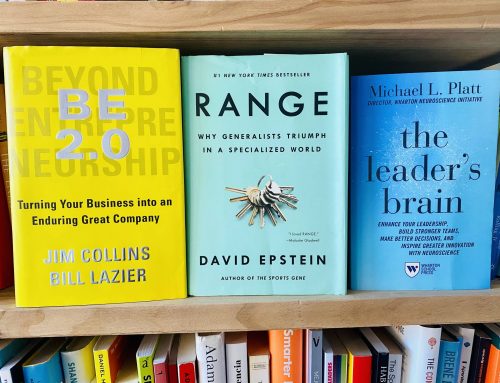This week I will make an exception and divide the article into two so as to cover in more detail the seven keys to build a high performance team that Jon Gordon and Mike Smith share in You win in the locker room first, one of the books I mentioned on Instagram in which they analyze the factors that took the NFL team Atlanta Falcons to become a winning team after several seasons with a losing record. Here are my favorite insights:
1) Promote your organization’s culture
Purpose is the emotional glue of an organization and a great way to work on it is by creating our culture, our symphony with the notes that we choose. If we don’t learn to create an organization’s culture, relationships won’t be authentic and if there are no authentic relationships it will be difficult to achieve a sustained commitment over time.
Atlanta Falcons coach Mike Smith promoted the team culture and sense of belonging by giving several books to the players and staff and he organized a group discussion about the books and the habits that could help the team reach excellence.
2) Be contagious
“Never a bad day, only bad moments”
Research from Harvard University shows that the emotions we feel are contagious and that we can “provoke” good emotions to appear. Same as our team can catch our flu, they can also catch our bad gesture or angry face. Likewise, a smile, a “thank you” and a “good job” can be very contagious.
Research also shows that you can’t be stressed and thankful at the same time. “Practice gratitude, and find mindful moments of calm to make communication and connection happen. You and your team will be glad you did.”
And try to instill this positivism in everyone around you: “As a coach and leader one of the most important things I must do is make sure our players and staff believe that tomorrow will be better than today.” (Pete Carroll, Seattle Seahawks Head Coach).
“If you are complaining, you are not leading. If you were leading, you were not complaining.” We can’t become a positive influence if we spend the day complaining about everything.
“One person cannot make a team but one person can break a team. You must also weed the negative from your team.”
3) Be consistent
Being consistent, coherent and predictable will not guarantee success (nothing will) but it will make our teams know what to expect from us as I recently mentioned during an interview about Zidane’s leadership style. Coherence is the basis of trust, and as such, we need to work on it every single day. The key once again lies in the invisible work; there is no magic formula.
4) Communicate
“When there is a void in communication, negativity will fill it”.
Communication is the foundation of every great relationship. Communication builds trust. Trust generates commitment. Commitment fosters teamwork, and teamwork delivers results.

Doc Rivers: “the most important thing I do as a coach is to communicate with my team.”
And here is a challenge: Would you say Zidane is a great communicator? I bet you thought of him as a speaker, not as a listener. Communication is not just about speaking. In fact, the best communicators are usually not those who speak better but those who listen better.
Mike Smith: “I developed a great relationship with my players and it did not start with me talking. It started with me asking questions and listening. Every morning I would ask “what is the temperature today”?
Checking our team temperature is key to focus on the process and to detect potential problems soon.
If we love to reach 10,000 steps on our activity wristband every day, we could also set a goal of 100 of those steps in our office, being accessible, asking our team and acting as a resource for them, and trust will increase as a consequence. A few days ago one of my clients told me: “the thing I value most about my CEO is that he calls each of us every day just to check how we are feeling.” Regardless of our team size, the key is to apply this philosophy and adapt it to our reality. To achieve a committed team, let’s give what each person needs and this can only be done by knowing what they worry about most.
Pedro Díaz-Ridao







Leave A Comment